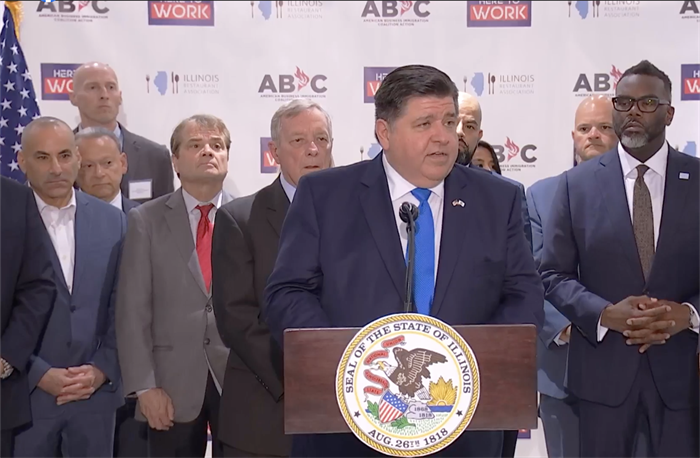CHICAGO – A coalition of elected officials and business leaders in Illinois is calling on President Joe Biden to ease work restrictions for asylum seekers and other long-term undocumented workers – a move they say is both humane and would help solve ongoing labor shortages.
In the year since Texas Gov. Greg Abbott and other Republican governors began bussing and flying Central and South American migrants to so-called sanctuary cities, Chicago city leaders report they have received more than 13,000 asylum seekers. The vast majority are not legally authorized to work in the U.S., leaving them with little choice but to either wait on already stretched-thin services or find under-the-table work, often for extremely low wages and sometimes in dangerous conditions.
At the same time, employers in Illinois are having trouble filling thousands of jobs across industries like food processing, health care, transportation, and energy. State and business leaders on Wednesday urged the federal Department of Homeland Security, or DHS, to allow Illinois – and other states – to sponsor migrants and other undocumented immigrants in order for them to get work authorization permits.
“The best way for us to manage through this lengthy crisis is to tap into the extraordinary value that immigrants bring to our workforce,” Pritzker said at a Chicago news conference Wednesday. “We have the jobs. We have the people. We just need authorization from Washington.”
Generally, asylum seekers can’t apply for work permits from DHS until approximately five months after they’ve applied for asylum in the U.S. – a process that itself can take months.
But the work permits are temporary, if granted at all, and depend on migrants’ successful navigation of the paperwork DHS requires of applicants.
Instead, Pritzker, along with Chicago Mayor Brandon Johnson, U.S. Sen. Dick Durbin and other elected officials called for DHS to streamline and expand its existing program aimed at allowing refugees “paroled” into the U.S. from countries like Afghanistan, Cuba, Haiti, Nicaragua and Venezuela to get slightly faster access to work permits.
Illinois’ Fiscal Year 2024 budget, which began in July, set aside $42.5 million for asylum-seeker services – the latest installment of the $250 million the state and city of Chicago have already pledged to support the migrants in the last year since they began arriving.
But Johnson said his city needs more help from the Biden administration, including resources and tweaks to the immigration system.
“Let me state this clearly: The city of Chicago cannot go on welcoming new arrivals safely and capably without significant support and immigration policy changes,” Johnson said. “This change would be a commonsense measure that would provide greater opportunities for new arrivals and immigrants to build their lives here in the state of Illinois.”
Johnson and Pritzker on Monday sent a letter to DHS Secretary Alejandro Mayorkas advocating for the state-sponsored work permit solution, following similar letters this summer from Durbin, U.S. Rep. Jesus “Chuy” Garcia, IL-4, and New York Gov. Kathy Hochul. In February, Republican Govs. Eric Holcomb of Indiana and Spencer Cox Utah floated the idea in a joint op-ed in the Washington Post.
Illinois Manufacturers’ Association President and CEO Mark Denzler, whose organization is often aligned with Republicans in Springfield, said Wednesday he doesn’t view immigration reform as a partisan issue, but rather “an American issue” that needs solving “today.”
“Manufacturers, like retailers and hospitality and hotels and hospitals, are all struggling to find qualified workers, whether engineers or frontline workers, employees of all skill levels who can earn a good wage and benefits,” Denzler said.
Durbin added that he’d just completed a one-month tour of Illinois, where he’d heard from essential businesses like hospitals that were considering cutting services because of workforce shortages.
The push for state-sponsored work permits isn’t limited to asylum seekers. Long-term undocumented workers – some who are eligible for the Deferred Action for Childhood Arrivals, or DACA, program – are also included.
But not everyone who is eligible for DACA ever applied. Estela Gambino, a 33-year-old mother of six, said the nearly $500 fee stopped her from applying, in addition to lack of help navigating the application process.
She shared that she’d once been offered a job as a teacher’s aide in a day care center, but she had to turn it down and was embarrassed to share with the center’s director that she was undocumented. Afterward, Gambino said, she got depressed.
“I want to have a good job. I want to buy a house I want to buy a car,” she said. “My kids deserve a stable life. And I’m working as hard as I can. But I need a work permit…to get a good job and to continue to contribute to Illinois and Chicago.”
Buses of asylum seekers sent from Texas to Chicago have come in waves over the past year. In May, Gov. Abbott vowed to keep sending migrants in a response letter to then-Chicago Mayor Lori Lightfoot, who’d urged him to stop the buses. Earlier this month, a toddler died on the most recent Chicago-bound trip while traveling through southern Illinois.

